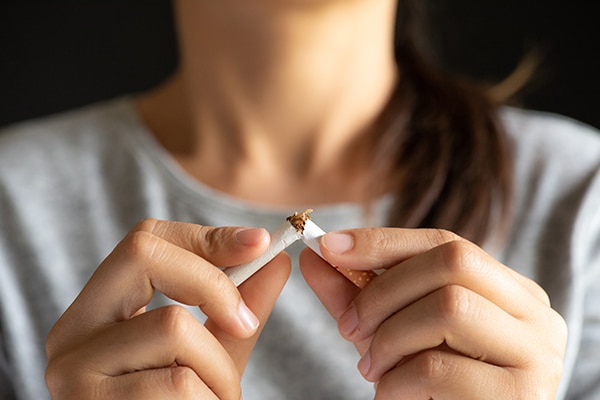4 Reasons Your Urologist Wants You to Quit Smoking
January 5, 2024

One in four Philadelphia adults smoke. For the sake of your kidneys, bladder, and fertility, consider making 2024 your time to stop.
Philadelphia in fact has the highest rate of smokers of the country’s 10 largest cities, according to the Centers for Disease Control: 25.2%. And with each cigarette, each of these adults inhales thousands of harmful chemicals, includinglead, formaldehyde, ammonia, and arsenic.
That’s a lot of toxins packed into a narrow cylinder. And when they pass into your urinary system, they can cause a lot of harm. Conditions linked to smoking include urinary cancers, kidney stones, incontinence, erectile dysfunction, and painful bladder syndrome (interstitial cystitis).
How the Chemicals from Smoking Affect Your Urinary Tract
Your organs process and filter everything that enters your body. If the chemicals in cigarette smoke are not fully screened out, they will be carried through your bladder and into your urinary tract.
Here’s how smoking affects the different parts of your body’s urinary system.
- The toxins seep into your tissue. When the chemicals from smoking enter your lungs, they are absorbed into the blood stream, which is filtered by your kidneys. If the toxins become concentrated in the kidneys, they can mutate the cells, leading to kidney cancer. Research shows that smoking doubles the risk of developing this disease.
The waste and substances are then passed into your urine, which is stored in the bladder. Just like your kidney cells, your bladder calls are then at risk of developing into bladder cancer. Smoking is the leading cause of the disease.
- The elements in smoke can crystalize. Some studies suggest that smoking can produce higher levels of chemicals that can cause crystals to form in the kidneys, leading to kidney stones. The toxins in cigarette smoke also have been linked to the formation of calcium stones.
- Smoking bothers your bladder. The chemicals in tobacco smoke can irritate the bladder, making you urinate more frequently. Meanwhile, coughing spasms from long-term smoking can eventually weaken your pelvic muscles, leading to incontinence – leaking urine when you cough.
Further, because smoking irritates the bladder, it can worsen a painful condition called interstitial cystitis, an inflammation of the bladder lining.
- Smoking slows circulation, and hormones. Good blood circulation is required to get and maintain an erection, so heavy smoking can raise the risks of erectile dysfunction. Additionally, the substances you inhale can interfere with hormone production and damage the DNA of eggs and sperm, contributing to infertility.
How to Know If You Have a Urinary Illness
Urinary conditions present themselves through a variety of symptoms, but a few key signs are common.
If you experience painful or more frequent urination (especially at night), cloudy or pinkish-brown urine, and/or pain in the back and the sides, it might be time to contact a urologist. These symptoms can signal bladder infection, hematuria(blood in the urine), kidney stones, and cancers.
Changes You Can Make to Make Quitting Easier
Smoking typically accompanies daily routines, so changing them could make the journey easier. These three suggestions might help.
- At the times you usually take a smoke break, go for a walk or work on a puzzle instead.
- Put off events that include smoking, such as drinks with friends.
- Plan to quit while on vacation, when you’re away from familiar triggers.
Finally, reach out for support. Smokefree.gov can help you build a quit plan, and the National Cancer Institute’s live online support can guide you through tough periods.
If you are a smoker experiencing any of the above symptoms, your doctor also can provide resources to help you quit, as well as diagnose and treat your symptoms. You might even qualify for a clinical trial of a promising treatment at MidLantic Urology. Contact us here.

